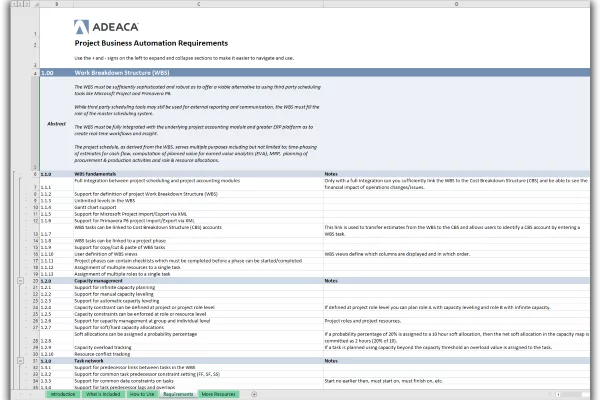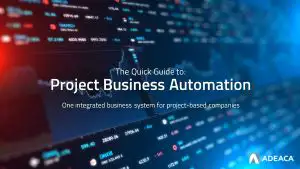Are you a project-based company utilizing a host of disparate tools and applications (e.g. project accounting, project management, ERP, and lots of spreadsheets) to run your entire business? If this sounds familiar, you are in desperate need of a better solution. Of course, looking for a new or enhanced business system can be time consuming and challenging; however, if you take the time to set your goals, do your research and generate your business requirements, you’ll be able to eliminate the different point solutions for one comprehensive business system.
Lack of a Data Structure = Low Visibility and Lack of Control
The truth is, operating in a fragmented environment means there is no way to structure your data in a way that gives you greater control and better visibility over your projects. And when you fail to know what is going on within your business and the status of your projects, you open the door to missed opportunities to be more productive and profitable.
Before purchasing a new ERP, project management, project accounting, project analytics or related system, make sure it covers core project functions that you require. Keep in mind, thinking holistically about your Project Business allows you to rethink what a comprehensive business system should look like for your project-based company.
Operating in Many Systems vs. One Comprehensive Solution
When the goal is to increase efficiency and collaboration, while eliminating unnecessary point solutions and the overhead to maintain them, you need to create a list of core Project Business processes and the associated integration points to achieve an end-to-end system for your project-based company.
We created a business requirements document template to get you started in understanding the requirements necessary to evaluate any ERP or business system for its Project Business capabilities. The four main areas covered in this template include: Project Operations, Project Financials, Analytics and Collaboration.
It includes a list of capabilities categorized in key areas that help define the business requirements for any project-driven company. Study these areas and make sure that any system you evaluate incorporates these capabilities proficiently enough for your business.
Work Breakdown Structure: The WBS needs to be sufficiently sophisticated and robust as to offer a viable alternative to using third-party scheduling tools such as Microsoft Project and Oracle Primavera. The WBS must be fully integrated with the underlying project accounting module and greater ERP platform to create real-time workflows and insight.
Cost Breakdown Structure: The CBS must provide a reporting hierarchy complex enough to negate the need for data manipulation in Excel. The CBS must be linked to the WBS for easy transfer of labor estimates and application of the project schedule for time-phasing purposes.
Project Costing: The project costing framework must provide a detailed view of everything regarding project financials and should facilitate seamless analysis against the defined CBS.
Project Supply Chain: Information must flow freely and in real time between supply chain functions and the project management system. Keep in mind, the project CBS and WBS should be referenced against supply chain documents to enable accurate financial and operational tracking and alignment.
Issue Management: An issue register must be maintained for each project and individual risks should be referenced against the tasks in the WBS.
Role and Resource Management: Roles and resources are assigned to WBS tasks and form the basis of capacity management.
Project Accounting: A strong, direct and real-time interface between the general ledger and the project system is required. Project accounting functions for project-based companies should include more than just basic accounting functions.
Subcontract Management: To ensure the subcontractor submits required documentation related to the subcontracted work, submittal requirements need to be defined.
Inter-company/Inter-department Management: This describes the processes and controls governing resource loans between legal entities (inter-company) and departments (inter-department).
Reporting and Analytics: The solution must provide real-time visibility into project performance across financial and operational components. A framework to present key stakeholders with timely and actionable information should be central to the reporting capabilities of the solution you select.
Use the Business Requirements Template as a Guide
The template we created is meant to act as a guideline. Each of the sections mentioned above covers 80 percent of the Project Business functionality needed by most project-based companies. Of course, some of these sections may cover functions that your business does not require, which is why we made this template completely customizable to meet your needs. You can supplement these core requirements with your unique business needs and eliminate the line items that are not applicable. Download it now.











